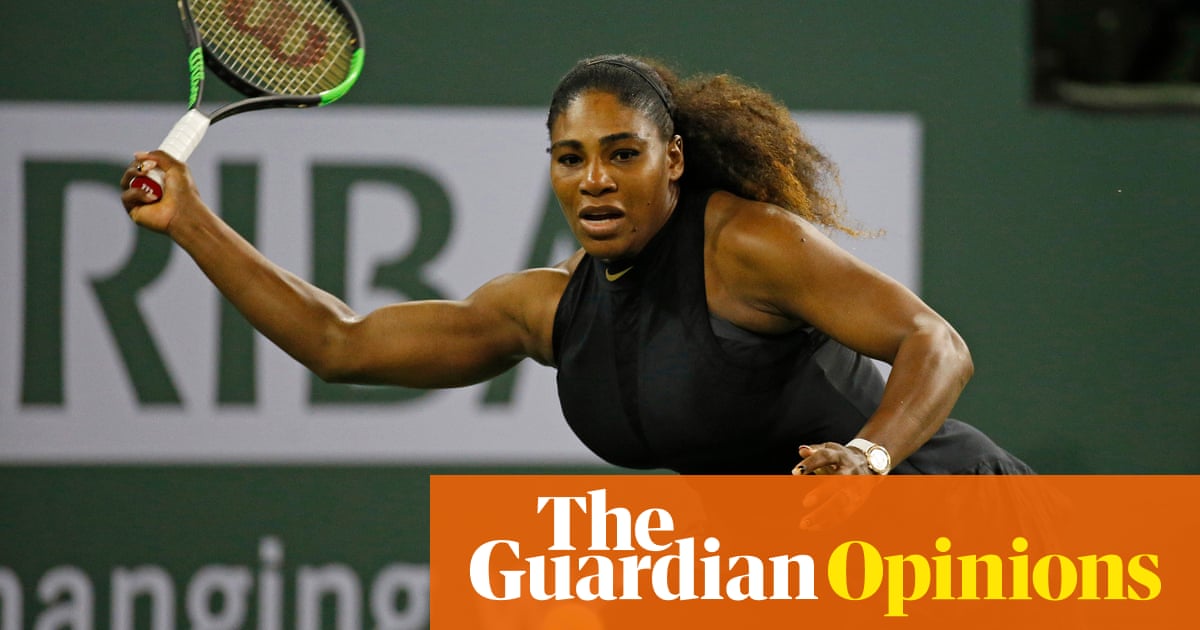Would someone please give Serena Williams a break? Two weeks into her comeback, seven months after giving birth to daughter Olympia (her name chosen from a shortlist of those associated with strength), the winner of 23 grand slam singles crowns was forced to endure another round of the rubbish that has been as consistent a part of her career as the titles.
Williams had to enter the Miami Open this week as an unseeded player, a wildcard in fact. This despite the fact that she left for her maternity leave as the women’s world No 1, at 35 years and seven months the oldest person ever to hold that position. Without commenting on the matter herself, Serena’s deseeding has become a talking point in Florida after she was drawn against Naomi Osaka, last week’s Indian Wells champion, in the first round. The director of the Miami Open, James Blake, has suggested: “These kind of things shouldn’t happen.”
The seeding is in the gift of the WTA. It has a system of what it calls protected ranking, which allows an injured player to retain a rank averaged from the months immediately following their injury. But this ranking does not apply to seeding. Also, technically speaking, Williams – who plays Osaka on Wednesday evening – was never injured in the first place.
“She had a kid, which we should all be celebrating,” Blake said. “So when she comes back there should be a grace period where she can still be seeded.” Blake is not the only person to venture an opinion on this subject and, suddenly, maternity in tennis is a hot topic. Are female players being punished for having a child? Is having a child the same as a broken leg? Should the governing body of women’s tennis maybe have thought about these matters before now?
Simona Halep, the current WTA No 1, believes Williams should have been granted top seeding. The world No 66, Mandy Minella, believes no adjustment should be made at all. “The rule should stay as it is,” said Minella, who returned to tennis in February, 99 days after giving birth. “There are many players who have been out because of pregnancy and there will be many more. I don’t think we would be talking about this if it wasn’t Serena.”
Needless to say it is not the first time that people are talking about something because of Serena. The Miami Open has given equal prize money to both its male and female winners since 1985, but it is an outlier. At other events on the WTA circuit a champion will still earn far less than their equivalent on the ATP tour. Williams has been making the argument for equal pay for years. In return she has not only had to listen to snide questions from male journalists quoting court-time statistics but also enjoy the diatribes of male executives who believe female players should “get down on their knees” and “give thanks for the men who made their career” possible.
That opinion belongs to Raymond Moore, the former CEO of Indian Wells who stepped down amid the outrage at his remarks and which just happens to be the other tournament Serena has entered unseeded since her return. Indian Wells is an infamous location in the Williams legend, the place where Serena’s father Richard railed against racist abuse from the crowd when Serena won the final in 2001. She subsequently boycotted the tournament for 14 years.
The struggle of being a prominent female African‑American athlete has hardly gone away during that time. This winter Williams learned that her fellow American player, Tennys Sandgren, had made an apparently derogatory tweet about her using foul language on court. It was part of a torrent of screenshots of deleted social media bilge attributed to Sandgren on Twitter, forcing him to deny he was an alt-right sympathiser. The woman who has claimed 316 grand slam match wins in her career wrote to this man, who sounds like he changed his name to celebrate both his preferred sport and an interest in Viking lore, and asked for an apology on behalf of an “entire group of people”. Sandgren has since apologised, but only for homophobic remarks he made on another occasion.
Williams did not have to step into the Sandgren hellhole, some suggest. Neither did she have to call out Novak Djokovic over his remarks on equal pay. And if she did not want to have her body criticised (as it has been throughout her career) she should not have posed for the cover of Sports Illustrated or, later, Vanity Fair while pregnant.
That Williams, the only player male or female to win a career golden slam after the age of 30, has any choice in the matter seems laughable, however. For a start the idea that black people with opinions are difficult is a trope that for generations has given white people cover to provoke them with whatever material they like. Make a story about Serena and it stirs up a whole slurry of associated resentment that will provoke engagement in an audience. That Williams could choose to somehow ignore that seems naive.
It would be nice if Serena could have some time off from all this, perhaps spend six months without becoming the figurehead for something eminently sensible yet somehow abhorrent to reactionaries. It would be nice if she received the respect she deserves for her tennis career and that owed to her as a human being. But maybe she won’t. And if she doesn’t you can bet that a born competitor will keep up the fight at her end. In turn that might make Williams an icon whose significance carries beyond her sporting career.

